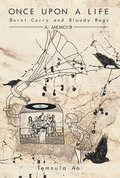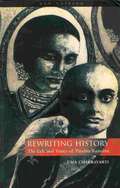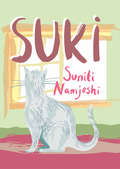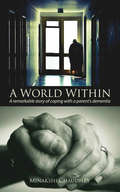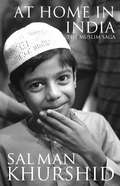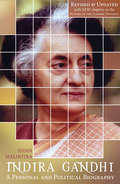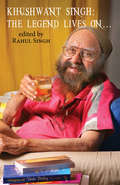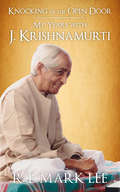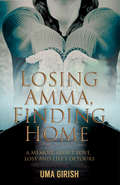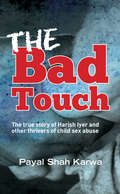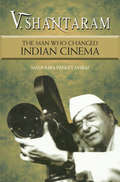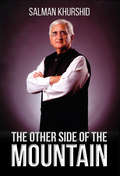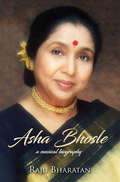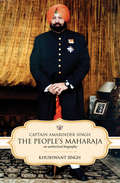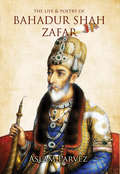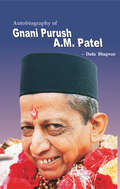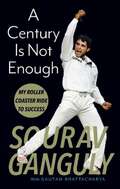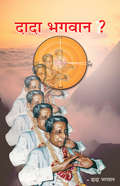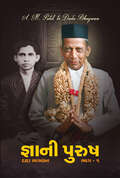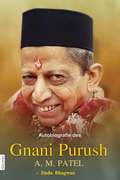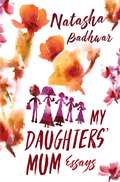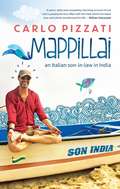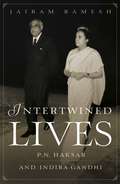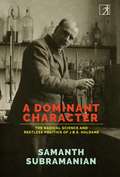- Table View
- List View
The Boatman: A Memoir of Same-Sex Love
by John BurbidgeThe six years John Burbidge spent in India in the 1980s as a community development volunteer changed him in many ways, but one stands out from all the rest. It led him to confront a deeply personal secret-his attraction to his own sex. After taking the plunge with masseurs on a Bombay beach, he found himself on a rollercoaster ride of sexual adventuring that went from abstinence to addiction in two action-packed years. A complicating factor in his journey of self-discovery was the tightly knit community in which he lived and worked, with its highly regimented schedule and minimal privacy that forced him to live a double life. There was also his fraught relationship with his mother. Written with honesty, passion and great personal integrity, The Boatman is a bold and fascinating account of the challenges, frustrations and fulfilment of finding love and selfhood in India. It is also an intense and intimate exploration of city life as we don't often know it. Revealing his love affair for India and his deep attraction for its young men, Johns story shows us how, when we dare to immerse ourselves in a culture radically different from our own, we may discover parts of ourselves we never knew existed.
Once Upon a Life: A Memoir
by Temsula AoBorn in 1945 in the Assamese town of Jorhat, Temsula Ao, her father's favourite of his six daughters, remembers her childhood as a time of happiness. The sudden loss of both parents mean that the orphaned children were left to fend for themselves as best they could. Desperately poor, emotionally scarred, lonely and often hungry, the young Temsula made up for her lack of resources with courage and determination. From these unpromising beginnings, Ao went on to become one of Northeast India's best known writers and to build a distinguished teaching career, serving as Director of the Northeast Zone Cultural Centre, and finally, Dean of the School of Humanities and Education, North Eastern Hill University, Shillong. Temsula Ao describes her memoir as 'an attempt to exorcise my own personal ghosts from a fractured childhood that was ripped apart by a series of tragedies... [it] is about love and what it is like to be deprived of it.' For her readers, Ao's memoir gives not only an insight into her role as a leading figure in the Northeast, but is also a moving account of a writerly life.
Rewriting History: The Life and Times of Pandita Ramabai
by Uma ChakravartiIn this classic study of Pandita Ramabai's life, Uma Chakravarti brings to light one of the foremost thinkers of nineteenth-century India and one of its earliest feminists. A scholar and an eloquent speaker, Ramabai was no stranger to controversy. Her critique of Brahminical patriarchy was in sharp contrast to Annie Besant, who championed the cause of Hindu society. And in an act seen by contemporary Hindu society as a betrayal not only of her religion but of her nation, Ramabai - herself a high-caste Hindu widow - chose to convert to Christianity. Chakravarti's book stands out as one of the most important critiques of gender and power relations in colonial India, with particular emphasis on issues of class and caste.
Suki
by Suniti NamjoshiIn 'Suki', fabulist Suniti Namjoshi weaves a delightful tapestry from threads of longing, loss, memory, metaphor, and contemplation. The whole picture is a stunning evocation of the love and friendship shared between S and her Super Cat, Suki, a lilac Burmese. Suki suggests that she could be a goddess, and S her high priestess. S declines, but as they discuss the merits of vegetarianism, or the meaning of happiness, or morality, or just daily life, it soon becomes clear that the bond between them is a deep and complex one. The days of Suki's life are figured as leaves, which fall vividly but irrevocably into time's stream and are recollected with a wild tenderness by the grieving S, who learns through the disciplines of meditation how to lose what is most loved. This beautiful narrative, both memoir and elegy, offers solace and celebration to everyone who has felt the trust that passes between a person and a beloved creature.
A World Within: A Remarkable Story of Coping with a Parent's Dementia
by Minaksh ChaudhryThis story is an unfinished one. The story of a man dying in slow motion . . .He clings to flashes of memory and grapples with his ‘reality’. As he chases the mirage of his memory, his world disappears fragment by fragment. It is not just his being, his self that disintegrates every moment; it is the universe as he knew it that fades into oblivion. This is a tale of a man building bridges to nowhere. Everything around you changes when you take care of a parent with dementia. This person who had been bedrock of your strength, to whom you looked up to and who was always there for you is now nothing close to his former self. His enquiring glances, puzzlement, doubts and demand for answers signal a total shift in relationship. The despair also reveals the person you are – temperamental and escapist. But this journey has life lessons too: When drama of life ends, you will have nothing; today is all you have, so enjoy life. With tears there is laughter and amidst confusion there is clarity that life goes on and we must flow with it. Here is A World Within . . .
At Home in India: The Muslim Saga
by Salman KhurshidA comprehensive, definitive and forceful account – by a witness to recent history in the making – which highlights the fact that Muslims do feel at home in India and also provides rare insights into their thought processes, their aspirations and their problems, As a former Union minister who has held several crucial portfolios, Salman Khurshid, on the basis of his vast and varied experience, recounts how Muslims in India accept this country as their own despite many provocations and allegations doubting their patriotism. In the process, he reinforces his contentions by providing numerous real-life examples of how the community has proved its commitment and capability by making immense contributions in almost all fields. This timely volume, which covers a wide span from the late nineteenth century to the present, brings out succinctly the pivotal roles played by a galaxy of distinguished Indian Muslims. The author describes how the Aligarh Muslim University in Uttar Pradesh and the Jamia Millia Islamia (Delhi) came into being and how many of their alumni became part of the freedom movement and made sincere efforts at fostering and maintaining communal harmony. Post-Independence, Salman Khurshid emphasizes the importance of outstanding Muslim leaders who served as role models for the younger generation. The author does not shy away from hypersensitive issues such as terrorism, communal riots, a Uniform Civil Code, present-day Muslim leadership (or lack of) and the place of women in Islam, with a focus on the Shah Bano case. He underscores the significance of the ‘trust deficit’ on the part of Muslims vis-à-vis the police (based on a recent report of the directors-general of police from different states) and spotlights the July 2014 verdict of the Supreme Court with regard to the Shariat and fatwas. He rounds off the book with an analysis of what the future could hold after the recent victory of the Bharatiya Janata Party and its allies in the 2014 Lok Sabha elections. Salman Khurshid tackles each and every topic with candour, sensitivity and forthrightness.
Indira Gandhi: A Personal and Political Biography
by Inder MalhotraA definitive, incisive and no-holds-barred account of the life and times of one of India’s most charismatic and prominent leaders who has left a distinctive stamp on history For almost two decades, Indira Gandhi stood out the world’s most powerful woman. In India, there is hardly a neutral opinion about her. She is either adored or abused. Inder Malhotra’s biography explores objectively this highly complex and very private person – right from her childhood to her last days – who lived under constant public gaze and learnt to adjust her demanour to the occasion, rigorously concealing her true self and real feelings. This comprehensive work recounts her unusual and unhappy ‘love marriage’ to Feroze Gandhi and examines the ambivalent influence of her father, Jawaharlal Nehru, on her career. It also focuses on her relationship with her sons: Sanjay, her chosen heir, and his elder brother Rajiv, who, ironically, succeeded her as the prime minister of India. The author traces Indira Gandhi’s own evolution from a ‘dumb doll’ to the ‘empress of India’ and her downfall, the seeds of which were sown when she imposed the Emergency on 25 June 1975. This phase marked a dark period in the post-independence era. Her party (the Congress) lost the March 1997 general election and she was out of power for nearly three years. The author also describes the later revival in her fortunes, when she returned as prime minister in January 1980. During her second term, she had to order the Indian Army to enter the Golden Temple in Amritsar (the holiest shrine of the Sikhs) to flush out the militants hiding there. This move led to her being assassinated by her own Sikh bodyguards on 31 October 1984. In the revised and updated edition, Inder Malhotra throws light on the impact that Indira Gandhi had (and continues to have) on Indian politics after her death when her mantle fell on members of her family, including Rajiv Gandhi first and Sonia Gandhi later. This is not only a compulsive and gripping narrative about a remarkable personality but also a fascinating study of India after independence.E41
Khushwant Singh: The Legend Lives On . . .
by Rahul SinghHere was a man. Prolific writer Acerbic critic Editor nonpareil Trenchant humourist Connoisseur of single malt Lover of life, words, women, and all things beautiful ‘You know that I am 99 years old.’ I replied: ‘May my years be added to yours.’ He looked up at me with the softest expression, and said: ‘No, but may you live as long as I have.’ I held his hand, the hand that had spent a lifetime writing books and inimitable articles, and kissed it. He brushed his cheek with mine. Both of us knew that it was a farewell. I left and stood on the gravel outside … – Fakir Syed Aijazuddin, Features Writer, Dawn … the Patiala Peg of publishing is no more! But we will continue to raise our glasses and thank him for liberating us from our idiotic, hypocritical, fake, humourless lives … for making us laugh at ourselves … for ridding us of quaint sexual hang-ups … for chucking old rules into the waste basket … for caring a damn! Jeena isi ka naam hai! – Shobhaa Dé, Bestselling Author
Knocking at the Open Door: My Years with J. Krishnamurti
by R. E. LeeAn insightful, revelatory and heartfelt narrative that bring out various unknown facets of the ‘world teacher’– J. Krishnamurti – and highlights his distinctive vision for education worldwide… This volume presents an eyewitness account of the practical and everyday relations of the Mark Lee with Krishnamurti (1895–1986) who was a prolific author as well as a renowned and respected educator, and speaker. Such relations reveal warmth and closeness, leading to a deep understanding of some of the unexplained mysteries surrounding the man and his teachings. Mark Lee was first introduced to Krishnamurti’s teachings as a teenager in 1955 and to Krishnamurti himself in 1965. For the next 45 years he worked in the Krishnamurti foundations as teacher, principal, director, and trustee in succession. It was Krishnamurti’s compelling and engaging admonition to ‘be a light unto yourself’ that kept Lee associated with the work of the foundations — a serious challenge — that called for inner discipline, austerity in thinking and living, and rigorous self-awareness. Krishnamurti was associated with several schools in India, England, and the USA from the late 1920s onwards. Five nonprofit foundations were established by him and continue to preserve and disseminate his teachings globally. For students of Krishnamurti’s teachings, Lee’s experiences can serve an informative and useful source of further learning and education. E39
Losing Amma, Finding Home: A Memoir about Love, Loss and Life's Detours
by Uma GirishUma Girish’s Losing Amma, Finding Home is a heart-rending narrative of losing a parent, living through the pain and transforming it to discover one true-calling and life’s purpose. This is a breathtaking inspirational and personal memoir that will ring true with every reader! When Uma arrives to start life in a Chicago suburb with her husband, 14-year-old daughter and her dreams in the spring of 2008, she has no clue of the cosmic wheels in motion. Barely four weeks later, her 68-year-old mother, in India, is diagnosed with Stage 4 breast cancer. Eight months later, she passes away. Losing her mother plunges Uma into the deepest despair, but more importantly, awakens a sudden clarity and knowing that ‘there has to be more to life than this’. As she begins to navigate a new country and culture, she is also called on to navigate the lonely terrain of grief. Life begins to open doors and Uma finds comfort, connection and purpose in working with seniors at a retirement community. Every relationship that she forms with the seniors opens her heart a little wider as she seeks answers to the only questions that matter. Who am I? Why am I here? What am I meant to do with this life? Interweaving two cultures through a textured narrative, Uma uncovers the truths of her inner journey as she transforms – one event, one person at a time.
The Bad Touch: The True Story of Harish Iyer and other Thrivers of Child Sex Abuse
by Payal Shah KarwaReal-life stories of victims of child sex abuse who emerged victorious! Harish Iyer is a survivor…nay… he is a thriver of child sex abuse. He is an award winning social activist who first shared his disturbing story of his sexual abuse on the television show Satyamev Jayate and who gave voice to the issue when most would be silent. Harish’s story will tear the reader apart. He suffers abuse at the hands of his uncle Satheesh, from the time he was seven. Harish was threatened that his parents would be killed if he did not submit to his uncle’s, and sometimes his friends’ barbarism. Until one fine day when Harish musters up the courage and says ‘No!’ He takes his mother into confidence who supports him, but Harish’s woes do not end there. He is castigated by society, his own father believes Harish to be at fault, and so begins Harish’s solo battle to help other sufferers like himself. There are others: noted film director Anurag Khashyap, a victim of incest and sexual abuse, not once but many times over; Jai, living in a Mumbai high-rise suffers abuse and a now 34-year-old mother who suffered sexual abuse as a 12-year-old. The stories in The Bad Touch will shock, horrify, sadden, repulse and numb the reader. But underlying them is the small ray of hope that if the immediate family is sensitive enough to the signals a child may send out, he or she may be rescued from being victimized. This book is a mission: to help ebb the trauma of survivors and inspire them with stories like Harish’s, and to create awareness of the issue of child sex abuse amongst parents/guardians.
V. Shantaram: The Man Who Changed Indian Cinema
by Madhura Pandit JasrajHe immortalized movies on celluloid… An authentic, heartfelt, insightful and comprehensive account of one of India’s most respected and eminent filmmakers, who was an institution in himself…V. Shantaram (1901–90) stands out as a colossus in Indian cinema. As one of the pioneers in this field, he honed his skills not only as a producer and director but also as an actor, writer, cameraman, technician and editor. He effectively used the medium of cinema as a vehicle for creating awareness about numerous social problems (such as communalism, dowry and the cycle of debt and poverty) and tried to bring about a change in society. This riveting biography – penned by his daughter – brings alive the life and times of Shantaram and his contemporaries, while simultaneously throwing light on a bygone era of Indian cinema marked by struggles, uncertainties and difficulties but yet infused with hope, perseverance and determination. Among Shantaram’s prominent creations in Hindi are Ayodhya Ka Raja (1932), Sairandhari (1933; India’s first colour film), Amrit Manthan (1934), Duniya Na Maane (1937), Aadmi (1939), Padosi (1941), Dr Kotnis Ki Amar Kahani (1946), Dahej (1950), Janak Janak Pyal Baaje (1955), Do Aankhen Barah Haath (1957), Navrang (1959), Sehra (1963), Geet Gaya Pattharon Ne (1964) and Pinjra (1972)
The Other Side of the Mountain
by Salman KhurshidAn authoritative, forthright and thought-provoking narrative that attempts to analyse why the Congress lost the 2014 Lok Sabha elections and also focuses on the fluctuating fortunes of the Bharatiya Janata Party and other political parties, besides dealing with crucial issues having a bearing on the country’s future. As a former minister who has held important portfolios in the Congress-led United Progressive Alliance Government, Salman Khurshid has witnessed crucial behind-the-scenes developments that have had a profound impact on the destiny of the nation. Beginning with the reasons for the rout of the Congress in 2014, including the series of scams that sealed its fate, he goes on to point out that the party has the ability to bounce back, given the many setbacks that have affected the Narendra Modi Government at the Centre as well as some BJP-ruled states and the Aam Aadmi Party Government in Delhi. The author next highlights the role of the media, which, he feels, was largely instrumental in ensuring the Congress’s defeat. He, nevertheless, acknowledges that, of late, the fourth estate has not spared the governments in power at the Centre and in the BJP-ruled states and has exposed the chinks in their armour (the growing brazenness of the right-wing forces, the Lalit Modi fallout and the Vyapam-related incidents).Thereafter, Salman Khurshid turns the spotlight on a range of significant and highly relevant topics, such as international relations (with an emphasis on Pakistan and the USA), the Election Commission’s role, communalism, minority affairs (especially the problems affecting the Muslims), the judiciary (and its overreach), the Nirbhaya tragedy and corruption and its impact, with a cameo on the Anna Hazare movement. Here is an insider’s perspective that is not only incisive and insightful but also vital for understanding the recent events in the political arena and their far-reaching ramifications.
Asha Bhosle: A Musical Biography
by Raju BharatanThe definitive saga, at once riveting and revelatory – studded with rare nuggets of information and fascinating anecdotes – that sparkingly brings out the life and times of an internationally acclaimed incredibly versatile singer. Asha Bhosle – a Guinness world record holder plus recipient of the Padma Vibhushan and the Dadasaheb Phalke Award – has held one and all spellbound for six decades now. Her voice, both fluid and flexible, has infused neo life into a variety of genres – from the melancholy melody to the rollicking rock-’n’-roll; from the soulful creation to the vibrant disco; from the romantic rhapsody to the rambunctious folk song; from the dainty ghazal to the boisterous qawwali; and from the pathos-filled rendition to the naughty-naugthy seductive number. The author – on the strength of his vast and varied exposure and experience – turns the focus on enthralling behind-the-scenes happenings that shaped the advance of this artiste with a remarkable range and a noteworthy body of work. ‘The world has no time for losers’ has remained Asha’s performing credo. This volume captures Asha Bhosle in her numberless shades. It is about how – in her silken rivalry with elder sister Lata Mangeshkar – she moved with panache from O. P. Nayyar to S. D. Burman to R. D. Burman. It is about how she served a galaxy of composers; about how, in the end, she reached the pinnacle all by herself. Against odds that would have driven any other woman into quitting. No quitter ever, Asha Bhosle, as the supernova supreme, just went on to underline the adage: ‘No power like woman power’. No more can you stay away from this marvel of a musical biography than you can stay away from the matchless musicality of Asha Bhosle. If she is one of a kind, so is this musical masterpiece capturing all the resonances and nuances going with her piquant persona. Here is a long-awaited career study shedding light on the twists and turns marking the starry-eyed world of Hindustani film music.
Captain Amarinder Singh: An Authorized Biography
by Khushwant SinghAn authentic, definitive and no-holds-barred narrative – packed with fascinating incidents and anecdotes – that brings alive the life and times of one of the most prominent, multifaceted and striking individuals (a former royal) in the sphere of Punjab politics Beginning with a historical background of how the Patiala kingdom came to be established, and ruled, over the centuries, the author moves on to describe the early years of Amarinder Singh (a scion of that kingdom). He then portrays the Indo?Pak war zone of 1965 (where the protagonist earned his spurs) and finally focuses on the combative arenas of Punjab politics, where numerous electoral and other battles have been (and continue to be) fought. This informative work unravels the subterfuges of politicians and others (including religious leaders) in trying to ensure their dominance. The pages reveal behind-the-scenes intrigues, plots and counter-plots even as Punjab was in the vice-like grip of terrorism in the late twentieth century. Operation Bluestar (June 1984) and its consequences have been objectively recorded. Besides tracing the career graph of Amarinder Singh, who reached his pinnacle when he became the chief minister of Punjab in February 2002, the author provides useful insights into crucial events that have made an immense impact on that state and the neighbouring areas over the past few decades. The text also throws light on Amarinder Singh’s five-year tenure as chief minister (marked by both positive and negative aspects) and on the following period, when Parkash Singh Badal regained that post. The contents are rounded off with an update on the Punjab scenario up to February 2017, which saw Amarinder Singh come back with a thumping victory. Here’s a saga that records history in the making in Punjab.
The Life & Poetry of Bahadur Shah Zafar
by Aslam ParvezAn absorbing, authentic and exemplary chronicle – studded with rare nuggets of information and enthralling anecdotes – of one of the most tragic figures of history who was witness to the end of a glorious dynasty First published in Urdu in 1986, this ‘labour of love’ brings alive the life and poetry of Bahadur Shah Zafar (1775 to 1862), the last Mughal Emperor. Zafar presided over a crucial period in Indian history when the country was subjugated and became a colony of the fast-expanding British Empire. Aslam Parvez’s account – with its wealth of detail – stands out in the manner in which it weaves together the strands of the political, the personal, the cultural and the literary aspects of a bygone era. This work is as much about the 1857 Rebellion as it is about Bahadur Shah Zafar, the reluctant leader of the rebels. The pages also evoke the captivating ambience of a period when formidable poets such as Mirza Ghalib, Sheikh Muhammad Ibrahim Zauq and Momin Khan Momin, apart from Zafar himself, came up with one creative gem after another. The author also provides a vivid and fascinating picture of Delhi during the last days of its cultural and literary splendour as the Mughal capital and as a custodian of Urdu literature and poetry. Finally, he recounts, in a touching manner, how Zafar spent his last days in Rangoon (where he had been exiled by the British) – a lonely and forgotten individual – far away from his beloved Delhi and from the trappings of his empire.
Autobiography of Gnani Purush A. M. Patel
by Dada BhagwanIn the arena of spirituality, there are unique and remarkable spiritual people who have achieved the highest levels of spiritual development. Some remain in seclusion, while others become spiritual teachers who support the spiritual transformation of humanity. But to meet a Gnani Purush (embodiment of Self knowledge), and to access their spiritual power to achieve spiritual enlightenment, is extremely rare. One such Gnani Purush of recent time is Dada Bhagwan. The book “Autobiography Of Gnani Purush A.M.Patel”, compiled from transcribed satsangs, describes his own process of instant enlightenment in his own words. Before achieving sudden enlightenment, Param Pujya Dadashri had led a spiritual life of tremendous spiritual awareness. Whether on a spiritual quest to discover what is spiritual enlightenment, or to learn about great spiritual people of recent history, this book is certain to inspire any spiritual seeker.
A Century Is Not Enough - Novel: My Roller Coaster Ride To Success
by Sourav GangulyIn this part self-development manual, part memoir, Sourav Ganguly takes you through his life. From his difficult debut in Australia to the highs of the Lord’s century, from beating Pakistan on its home ground to the vindictiveness of Chappell – he looks at how to overcome life’s challenges and come out a winner. Time and time again. Honest, straightforward and deeply moving, a century is not enough is both a sporting classic and a manual for living.
Dada Bhagwan?: दादा भगवान?
by Dada Bhagwanअम्बालाल मुल्जिभई पटेल (जिन्हें हम दादा भगवान के नाम से जानते है), इन्हें जून १९५८ में सूरत स्टेशन पर आत्मा के पूर्ण साक्षात्कार का अनुभव हुआ| मूल भादरण में एक बहुत ही प्रतिष्ठित परिवार में जन्मे अम्बालाल भाई कोन्त्रक्टोर का धंधा करते थे| जून १९५८ की एक शाम वह वड़ोदरा जाने के लिए सूरत स्टेशन पर, अँधेरा होने से पहले अपना शाम का भोजन समाप्त कर, ट्रेन का इंतज़ार कर रहे थे| जब उनका नौकर उनका डब्बा धोने के लिए गया तब उन्हें संपूर्ण ब्रम्हांड का ज्ञान केवल ४८ मिनिटों में हुआ| जगत कौन चलता है? मैं कौन हूँ? मोक्ष क्या है? मुक्ति का अर्थ क्या है? मोक्ष कैसे प्राप्त हो सकता है इत्यादि प्रश्नों का उत्तर उन्हें उन ४८ मिनिटों में हुआ| यह आत्म साक्षात्कार केवल एक ही जन्म का फल नहीं था परंतु उनकी जन्मो जनम की खोज का नतीजा था| ‘दादा भगवान’, इस शब्द का प्रयोग उनके भीतर प्रकट हुए भगवान को संबोधित करने के लिए किया जाने लगा| A.M Patel, शादी शुदा थे पर उन्हें बचपन से ही सनातन सुख और शाश्वत धर्म को जानने की कुतूहलता रहती थी| ऐसे अद्वितीय इंसान, मतलब अम्बालाल भाई ने जून १९५८ में लोगो को आत्मा ज्ञान प्राप्त करवाने का आसान तरीका खोज निकला जिसे उन्होंने ‘अक्रम विज्ञान’कहा|
Gnani Purursh 'Dada Bhagwan' Bhag-1: જ્ઞાની પુરુષ ‘દાદા ભગવાન’ ભાગ-૧
by Dada Bhagwanપ્રત્યેક કાળચક્રમાં ઘણા જ્ઞાનીઓતથા મહાન પુરુષો જન્મ લે છે. પરંતુ તેઓની આંતરિક જ્ઞાન દશાનું રહસ્ય હજુ અક્બંધ રહી જાય છે. પ્રસ્તુત ગ્રંથ “જ્ઞાની પુરુષ” માં પરમ પૂજ્ય દાદા ભગવાનના જ્ઞાન દશા પૂર્વેના વિવિધ પ્રસંગો તથા તેમના વિચક્ષણ જીવનશૈલી સમા અદ્ભુત દ્રશ્યોનુંતાદ્રશ્ય અહીં વિગતવાર જાણવા મળે છે. એક સામાન્ય માનવી હોવા છતા એમની મહીંસમાયેલી અસામાન્ય લાક્ષણિકતાઓ રૂપી ખજાનો છતો થાય છે. તેમના જીવનના માત્ર એક પ્રસંગમાંથી અદ્ભૂત અધ્યાત્મિક ફોડનું વિશ્વ દર્શન પ્રસ્તુત ગ્રંથ દ્વારા કરાવ્યું છે. જીવન વ્યવહારમાં સચોટ નિર્ણયશક્તિની સૂઝ તથા વ્યવહારીક સમજણની અટકણોના ફોડરૂપીઅનોખી સૂઝનો ભંડાર“જ્ઞાની પુરુષ” ગ્રંથ દ્વારાજગતને પ્રાપ્ત થશે. આ પવિત્ર ગ્રંથનું અધ્યયન કરી જ્ઞાની પુરુષના જીવન-દર્શનની અદ્ભૂત સફર કરવાની અમૂલ્ય તક ઝીલી લઈએ.
Autobiografie des Gnani Purush A.M. Patel
by Dada BhagwanIm Bereich der Spiritualität gibt es einzigartige und bemerkenswerte spirituelle Menschen, die die höchsten Ebenen der spirituellen Entwicklung erreicht haben. Einige leben in Abgeschiedenheit, während andere spirituelle Lehrer werden, die die spirituelle Transformation der Menschheit unterstützen. Aber einen Gnani Purush (Verkörperung des Wissens über das Selbst) zu treffen und Zugang zu seiner spirituellen Kraft zu bekommen, um spirituelle Erleuchtung zu erfahren, ist extrem selten. Dada Bhagwan ist solch ein Gnani Purush der letzten Zeit. Das Buch “Autobiographie des Gnani Purush A.M.Patel”, zusammengestellt aus überlieferten Satsangs, beschreibt seinen eigenen Prozess der spontanen Erleuchtung in seinen eigenen Worten. Bevor er plötzliche Erleuchtung erreichte, hatte Param Pujya Dadashri ein spirituelles Leben in enorm spirituellem Gewahrsein geführt. Ob man auf einer spirituellen Reise ist, um zu entdecken, was spirituelle Erleuchtung ist, oder um etwas über große spirituelle Menschen der vergangenen Geschichte zu lernen, dieses Buch wird sicherlich jeden spirituellen Sucher inspirieren.
My Daughter's Mum Part 1
by Natasha BadhwarA Simon & Schuster eBook. Simon & Schuster has a great book for every reader.
Mappillai
by Carlo PizzatiMappillai—‘son-in-law’ in Tamil—is the rollicking story of journalist Carlo Pizzati, a European living with his in-laws in urban Chennai and with his wife in rural Paramankeni. When in Paramankeni, he finds himself in the company of fishermen and goat-herders, in a house where 3G asserts itself in a corner of the bathroom and electricity courses through rooms in fits and starts. At one level, Mappillai is deeply personal. With beguiling candour, Carlo tells of his struggle with two extreme, contradictory responses to India—fascination and suspicion—and his awkward attempts at cruising through a maze of bribery, bureaucracy and traffic. Yet, at another level, the book offers a glimpse into the world of expats in contemporary India by introducing us to a host of colourful ‘firangi friends’—from those who are overwhelmed by this nation’s noise and colour; to those who ‘go native’ in kurtas; to those who believe that India is vast enough to accommodate their diverse selves as dreamers or yogis or artists. But, beyond all of this, Mappillai is the story of India. Over his decade long stay in this nation—one that has taken him north and south, west and east—Carlo has witnessed a land in flux—from the gloom and doom of 2008 when the New India dream shattered, to the heady optimism of 2015 with promises of ‘acche din’, right up to today, marked by the domination of anti-Romeo squads and gau-rakshaks. With wry humour and jollity, wisdom and acceptance, Mappillai offers an intimate capsule of contemporary Indian history—of the concomitant Hinduization and Westernization of India, intertwined with the Indianization of a European!
Intertwined Lives: P.N. Haksar & Indira Gandhi
by Jairam RameshThis is the first definitive biography of arguably India’s most influential and powerful civil servant: P.N. Haksar, Indira Gandhi’s alter ego during her period of glory. Educated in the sciences and trained in law, Haksar was a diplomat by profession and a communist-turned-democratic socialist by conviction. He had known Indira Gandhi from their student days in London in the late-1930s, even though family links predated this friendship. They kept in touch, and in May 1967, she plucked him out of his diplomatic career and appointed him secretary in the prime minister’s Secretariat. This is when he emerged as her ideological beacon and moral compass, playing a pivotal role in her much-heralded achievements including the nationalization of banks, abolition of privy purses and princely privileges, the Indo-Soviet Treaty, the creation of Bangladesh, rapprochement with Sheikh Abdullah, the Simla and New Delhi Agreements with Pakistan, the emergence of the country as an agricultural, space and nuclear power and, later, the integration of Sikkim with India. This power and influence notwithstanding, Haksar chose to walk away from Indira Gandhi in January 1973. She, however, persuaded him to soon return, first as her special envoy and later as deputy chairman of the Planning Commission where he left his distinctive imprint. Exiting government once and for all in May 1977, he then continued to be associated with a number of academic institutions and became the patron for various national causes like protecting India’s secular traditions, propagating of a scientific temper, strengthening the public sector and deepening technological self-reliance. Successive prime ministers sought his counsel and in May 1987, he initiated the reconstruction of India’s relations with China. He remained an unrepentant Marxist and one of India’s most respected elder statesman and leading public figures till his death in November 1998. Drawing on Haksar’s extensive archives of official papers, memos, notes and letters, Jairam Ramesh presents a compelling chronicle of the life and times of a truly remarkable personality who decisively shaped the nation’s political and economic history in the 1960s and 1970s that continues to have relevance for today’s India as well. Written in Ramesh’s inimitable style, this work of formidable scholarship brings to life a man who is fast becoming a victim of collective amnesia.
A Dominant Character: The Science and Politics of J.B.S. Haldane
by Samanth SubramanianJ.B.S. Haldane, scientist extraordinaire—born in Britain yet spiritually bound to India—remains one of the most enigmatic geniuses of the modern era. Here is a man who saw action in two world wars, engaged in the most radical politics of his day, conducted groundbreaking scientific research, and wrote with flair and conviction—yet Haldane&’s universe remains shrouded in mystery. <P><P>Award-winning author Samanth Subramanian’s latest offering undoes this travesty. Besides shedding light on Haldane’s contributions to genetics and evolutionary biology—he was the first to calculate the rate at which mutations occur and accumulate in genes—the book illuminates Haldane&’s inner world—his towering intellect, his radical vision of society, his provocative philosophy, and his attempts a wrestling with the essential moral questions that scientific progress must raise. <P><P>Equally, the book dwells on Haldane’s years in India—his journey to the nation; his affiliation with the Indian Statistical Institute, Calcutta; his attachment to the Genetics and Biometry Laboratory in Bhubaneshwar (where he died). Dronamraju’s description of Haldane as ‘the last man who knew everything’ was, at its simplest, an acknowledgement of his command over multiple subjects. But it was also an astute observation that Haldane’s era was the last time when the realms of scientific knowledge were limited enough for a single person to apprehend in near-entirety. To know everything was to see the forces of the world unified and to conceive of life in its full complexity. A Dominant Character will give readers a taste of that heady sensation.

